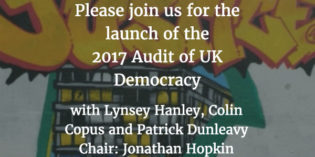Informing and engaging citizens

Many government consultations are more about meeting legal requirements than listening
Consultations are often a legal requirement for government departments – but this sometimes means they are formulaic and ineffective. In an extract from his report, Creating a democracy for everyone: strategies for increasing listening and engagement by government, Jim Macnamara (University of Technology Sydney/ LSE) looks at some of the failings of government consultation, and […]

Why democracies need open-minded introverts
In a well-functioning democracy, voters connect their own policy preferences to the political party that best represents them. Aaron Dusso’s new book examines how individual psychologies and people’s innate tendencies towards introversion or extroversion affects this ability. He finds that the more extroverted someone is, the less likely they are to successfully match their subjective policy […]

Join us at the LSE for the launch of our 2017 Audit of UK Democracy
On Thursday 12 October at 6.30pm Democratic Audit is launching our 2017 Audit of UK Democracy at the LSE with a discussion of the Grenfell disaster’s lessons for local government, public housing and social justice. Speakers include Lynsey Hanley, the author of Estates: An Intimate History, Prof Colin Copus and Prof Patrick Dunleavy, the co-director of Democratic […]

Eleanor Mills: women are still portrayed through the lens of a male, pale and stale establishment
A new report by Women in Journalism, “The Tycoon and the Escort: The business of portraying women in newspapers”, shines a light on the extent to which British media offer a male-dominated interpretation of society. The title refers to the description used in the coverage of the murder by a businessman of his lover, which as the […]

The Citizens’ Assembly on Brexit: reflections on the first weekend
The Citizens’ Assembly on Brexit – a gathering of randomly-selected people who will learn about the options for the form Brexit should take – has just begun its work. The project’s director Alan Renwick (UCL Constitution Unit) offers some initial, personal reflections on a highly successful first weekend. Members of the Citizens’ Assembly on Brexit. Photo copyright […]

Germany no longer bans extremist parties. But which European democracies do, and why?
As a last resort, democracies occasionally ban political parties. Angela Bourne and Fernando Casal Bértoa look at what kinds of parties have been outlawed in post-war Europe, and how the rationale for banning them has evolved. They explain how, early in 2017, Germany effectively put its party ban beyond use, forbearing even to close down […]

Six things to know about the German election
Ahead of Germany’s federal election on 24 September, Manès Weisskircher (European University Institute) highlights six things to know as voters go to the polls. While many observers are expecting a clear victory for Angela Merkel’s CDU/CSU, the performance of smaller parties will also be keenly followed – as it is highly likely there will be as many […]

Book review | Handbook on Political Trust, ed. Sonja Zmerli & Tom W G van der Meer
In Handbook on Political Trust, edited by Sonja Zmerli and Tom W G van der Meer, an international body of 41 experts offers an excellent overview of the scholarly literature on political trust, complemented by original empirical research and analysis. Across the chapters, the authors pinpoint gaps in the literature and identify new venues for research, making this handbook […]

How the EU shapes and hones its identity through the language of its treaties
How does the European Union shape and hone its identity? Odelia Oshri and Shaul Shenhav decipher the ways in which the EU’s discourse on values has changed throughout the 60 years of integration. They show that two values dominated the Union’s treaty texts – ‘democracy’ and ‘market economy’. However, since the 1990s, new values have penetrated […]



 Democratic Audit's core funding is provided by the Joseph Rowntree Charitable Trust. Additional funding is provided by the London School of Economics.
Democratic Audit's core funding is provided by the Joseph Rowntree Charitable Trust. Additional funding is provided by the London School of Economics.